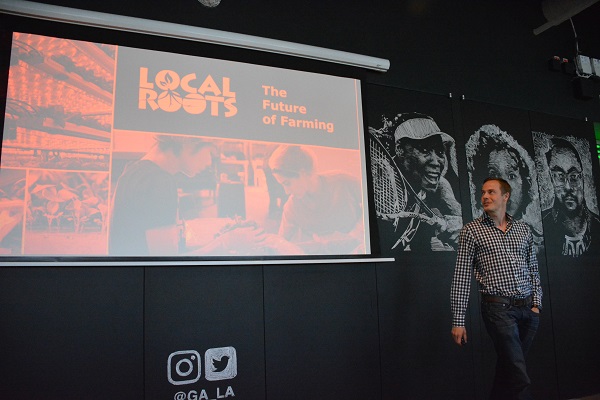by Dot Cannon
Cutting-edge technology, the future, and food.
These were the topics of conversation–and innovation–at the second edition of ToolBox LA, on Thursday in downtown Los Angeles.
This new monthly lunchtime series, started in February 2017, is geared towards exploring the ways local innovators can support the Los Angeles ecosystem. Los Angeles’ first hardware accelerator, Make In LA, organized the theme-based events, featuring pitches for new innovations and lots of networking.
And on Thursday, the theme was “AgTech”.

“We chose (agricultural technology) because it affects all of us, and the food we eat,” explained Make in LA Partner Carmen Palafox, in her opening remarks.

The day’s five ToolBox LA speakers would soon underscore that statement.

“Farmers are really the original innovators,” said Royse Law Firm Founder Roger Royse. “Almost any technology you can think of has an application in food production, futures or sales.”
And that innovation was going to be critical for the future. By 2050, Royse told the group, world population is expected to increase to nine billion.
“I don’t think anybody’s too alarmed about it. We’re going to meet our (food demand) targets pretty handily,” he continued, outlining the ways indoor farming and robotics could be key to future food production.
Critical to the innovation, Royce said, was a crop that doesn’t often get discussed.
“You know, nobody wants to talk about it, but cannabis is making a big difference,” he commented. “I’ve seen a lot of technologies that come from cannabis, because it’s such a high-value crop. I’ve seen LED lighting, (and) we have a co-op, in the Bay Area, that’s developed a shearing device.”
Meanwhile, he said, robots could soon provide answers to a shortage of farm labor.
“The most exciting technologies…are the artificial intelligence robots that can do things like sort fruit, based on its ripeness,’ he said. “And they can do that much faster than a team of humans could do it.”
Asked when farmers could start to use these robots, Royce responded, “They’re doing that now.”

Food waste and sustainability were the areas which California Safe Soil Founding Partner Dan Morash covered in his presentation. In California alone, he said, the average supermarket discards five hundred pounds of food per day.
“That’s enough to (compost) one acre of farmland for one year,” he said.

California Safe Soil, Morash explained, has patents, with additional ones pending, on organic recycling processes, turning food waste into a shelf-stable liquid fertilizer. Currently, California Safe Soil has one commercial facility in the Sacramento area, as well as a pilot plant which works with top agricultural college UC Davis. A facility in the Los Angeles area is the company’s next goal.
California Safe Soil technology turns food waste into fertilizer in three hours, he said, and is both odor-free and improves soil health, while reducing greenhouse gas emissions.
“This is about good science, as well as good environmentalism.”

Good science and use of data was very much at the core of Andreas Neuman’s presentation, as well. Neuman is President and Founder of UAV-IQ Precision Agriculture, which provides drone scouting and data-collection services, as well as software.
A large part of UAV-IQ’s function is providing information to help farmers maximize their return on investment. However, the drone services have a wider scope.

“Our focus is not just being accessible to farmers, but to other drone operators,” Neuman said. “(Drones) have really cool options that satellite information does, and man-made information does not.”
Health maps, areas of flourishing crops, problem-area identification and topography maps are all among the information drones can provide, he continued. One of the main services, though, is research.
“A drone is just a collection platform,” Neuman had explained, at the start of his presentation. (“It’s about the information that drone collects.”)

When Water Canary CEO Sonaar Luthra took the stage, he also talked about collecting information–but on water quality. Unlike current methods, Water Canary’s technology delivers water-quality data at low cost, in real time.
“Today, it takes two to seven days to test water quality,” he explained. “It’s not unlike collecting data from a crime scene (and by the time you get the data, it’s old).”
Current remote-sensing technology, Luthra added, gives real-time data but is prohibitively expensive.

So instead, he said, Water Canary delivers real-time data on water quality, through the analysis of light.
“We’ve been working on technology that measures properties of light, that eludes today’s sensors,” Luthra explained. “We’re trying to provide the world with…what we call a ‘weather service’ for water.”

And while the day’s final speaker had some equally innovative ideas, he told his audience that he wasn’t the first to implement them.

“It’s not new at all,” said Local Roots Farms Founder and CEO Eric Ellestad of his LA-based indoor farm. “Babylon discovered (indoor farming) as one of the Seven Wonders.”
But the benefits, he said, were very relevant to the future.
“(With) indoor farming, you get to avoid seasonality, pests, disease,” he explained. In addition, consumers could hope for better-tasting produce than in the past.
“(Spoilage concerns have meant) the farms start to select for varietals that are more durable (as opposed to flavorful).”
Local Roots Farms’ technology allows farmers to make additional specific choices, Ellestad continued. “The size of a head (of lettuce) you want to grow, a thicker leaf, a thinner leaf. It customizes to each indoor farmer.”
And the indoor-farming area? “We take a forty-foot shipping container and convert it into one of our farms.”

With all the information given, this second edition of ToolBox L.A. ran just two hours–which included lunch and networking. And it left attendees with a perspective on the future, perhaps best summed up by something Palafox said in her closing remarks:

“After today, I am more optimistic about our food.”
The next ToolBox LA event is scheduled for Thursday, April 11th at noon, at Loyola Marymount University’s Playa Vista campus. The theme will be, “Social Justice and Tech”, and admission is free. Here’s the link for information.
